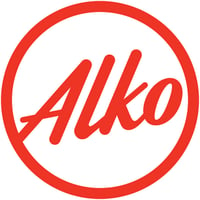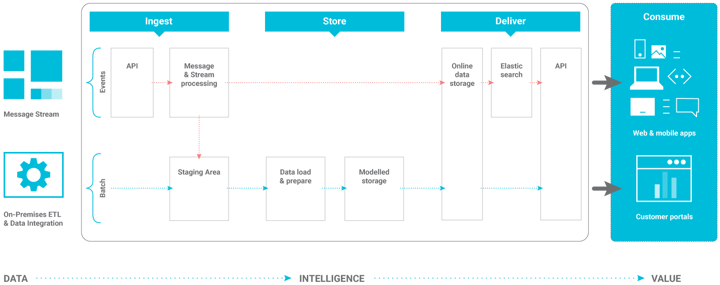
Customer story
Alko Inc is a state-owned limited company whose mission is to manage the exclusive retail of alcoholic beverages specified as its monopoly in the Alcohol Act. Alko offers its customers an excellent, responsible and professional service and interesting products. Alko systematically develops its customer experience through its stores and the online shop, using mobile solutions and online customer service. Alko’s goal is to further streamline its service across and between channels.
Cloud1 helped Alko renew its data warehouse in a project to build a modern platform for data management. The new solution increases the transparency, performance and cost efficiency of data storage. The solution will also serve future needs thanks to its modular and scalable architecture.
The old data storage solution used by Alko did not fully meet internal and external requirements. Their former data storage had reached capacity and was primarily used for reporting purposes. The project sought not only to build a functional reporting and analytics platform, but also to ensure that all relevant data is available in one place. From a centralised data platform, it is easier to distribute information to internal as well as external stakeholders or applications, and use data for analytics and reporting needs throughout the organisation. Data is now easily accessible by decision makers and users at all levels of the organisation.
One of the goals of the migration was to support Alko’s multi-channel, dynamic business model in the best way possible. To enable multi-channel service delivery, it is important that the same data can be utilized in the online shop, mobile solutions as well as in stores. Therefore, it was essential to create one truth of the data in a centralized location where it can be utilized and distributed in an effective and controlled manner.
Markus Maijanen, Product Owner of Alko Inc’s data and analytics platform, says that the project plays a key role in Alko’s roadmap for analytics as it enables future development. A unified data platform enables the development of advanced analytics solutions and multi-channel applications as well as a way to combine data differently than before. It will also enable development or expansion of the entire ecosystem at a later stage.
Furthermore, one of the key goals of the project was to make data accessible to all stakeholders easily. This enables the production of analytics extensively throughout the organisation, and data can be used as a basis for decision-making on a larger scale. The ease of use of Microsoft’s reporting and analytics tools makes it so the production of analytics does not depend on only a few persons within the organisation. Those involved in everyday business can now easily view and use analytics. This contributes to the goal of large-scale utilization of data in business development and strategy implementation.
A single data repository makes it possible to improve customer experience and increase customer understanding. A concrete example of this is real-time data on product availability, now enabled by the data platform. A centralised data platform ensures that the data is as up-to-date as possible and that the product availability data does not lead to errors undermining customer experience. A centralized data platform also helps to anticipate seasonal variations and develop the product range to better match customer needs.
One interesting feature of the new data platform is that besides providing information about the future, it also enables the utilization of historical data much more efficiently than before. For example, it is possible to broaden the ways we can subtly change consumer habits, needs, and behaviour in a whole new way. In the future it will also be easier to enrich data with sensor reads, weather forecasts, or other information enabling the building of various correlations. A centralized data platform makes it possible to discover new opportunities and gain a deeper understanding of your customers, allowing you to deliver an even better customer experience.

As we identify new needs or the volumes of processed data change, we can easily modify the overall architecture to perform exactly as needed without compromising any other business functionality.
Kaapro Kanto
CIO | Alko Inc
An efficient data platform requires strong and well-designed architecture.
In the early stages of the project, we defined a modular cloud-based architecture solution that allows cost-efficient modification as needs change. For example, the model manages different volumes of data, the combination of data sources, and the distribution of information from the data store in a secure and cost-effective way through the use of API management. The key to the model is its flexibility, scalability and adaptability. As such it allows for flexible business development also in the future.
That Cloud1 was able to conceptualize a modular and scalable architecture solution was a key factor in Cloud1’s selection as the provider of Alko’s modern data platform.
Alko’s data warehouse modernization project utilized Cloud1’s Data Hub concept. The Data Hub provides a single solution for data sharing and storage, as well as integrating business applications.
The concept draws upon a cloud-based data management model, which enables the use of data for various needs and in various ways. Integrations, modifications, storage and distribution are all done with Microsoft Azure technologies. The result is flexible, efficient to use, and allows easy cost control.
The Data Hub concept is visualized in the following illustration. It combines data from both traditional database sources and real-time event data. This data is used in the online shop as well as in the mobile app. The data from different types of sources merge in an optimised data model, from which they are made available to users through the user interfaces of systems. To meet different search needs, the solution includes an elastic search functionality based on Azure services. The data is published through general-purpose interfaces, making it easy to add new systems that make use of the data.
Example: compiling data from a variety of sources, the elastic search functionality and leveraging data with API management.

The example illustrates the adaptability of a modern data platform to various sources. It provides a unified interface for sharing information. If the architecture is scalable, there is no need to change the structure of the system as new features are developed.
In the bidding process, bidders were asked for their best architecture solution in addition to technology recommendations. According to Kaapro Kanto, CIO at Alko Inc, what made Cloud1 stand out was the combination of business expertise with technological know-how. Cloud1 was able to build the smartest architecture and highlight its business benefits in the most concrete way.
“What makes Cloud1 unique is that it combines a broad understanding of business with deep technological know-how. When business needs have been defined, they make it easy to implement the solution in practice.”
Kaapro Kanto, CIO, Alko Inc
Markus Maijanen also emphasises the importance of understanding business. The best result is achieved through open discussion and iteration.

It is always better to work together on a solution, since business people may not be able to name the product that works best for them.
Markus Maijanen
Product Owner | Alko Inc
Alko’s data platform is growing one business sector at a time. Following the building of basic capabilities, the project has advanced in agile stages.
Kanto divides the benefits of the project into three categories:
Kaapro Kanto states that the goals set for the project so far have been achieved, and more is expected as the project advances. Now we have a sound basis to build on.
Contact us to discuss how we can help your business or organization.
We assist companies that want to gain a competitive advantage through digitalization. We bridge the gap between business operations and technology to make it easier to leverage new digital solutions in business.